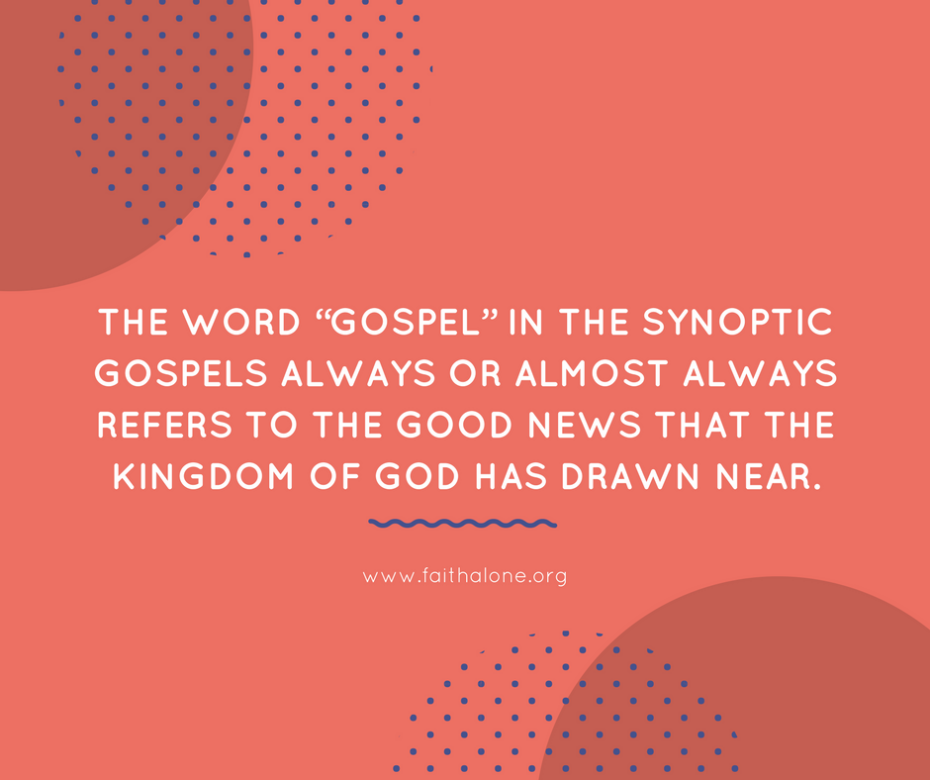Recently our church completed reading through the four Gospels. I noticed as I read that the word gospel is used in the four Gospels in a way that is different than how it is used in Christian-speak today.
For example, did you know that the word gospel does not appear in the text of the Fourth Gospel at all? It is only found in the title, and there it means something like holy biography.
But what about in Matthew, Mark, and Luke–the Synoptic Gospels? I urge you to do a concordance study. Or just read through them and mark each time you see the word gospel.
Here is what jumped out at me in my recent reading: The word “gospel” in the Synoptic Gospels always or almost always refers to the good news that the kingdom of God has drawn near. Another way of saying this is that it always refers to the fact that John the Baptist, the Lord Jesus, and the twelve were all offering the kingdom to that generation of Jews. The “gospel of the kingdom” is the good news of the kingdom, the good news that Messiah King Jesus is here and the kingdom is ready to commence if Israel believed in Jesus and repented of its sins. While individual regeneration is by faith in Christ, apart from works (John 3:16; 5:24; 6:28-29; Eph 2:8-9; Rev 22:17), national salvation from Gentile control required that the nation be not only believing, but also in fellowship with God (Matt 3:2; 4:17).
Here are some of the telling references in the Synoptics:
“Now after John was put in prison, Jesus came to Galilee, preaching the gospel of the kingdom of God, and saying, ‘The time is fulfilled, and the kingdom of God is at hand. Repent, and believe in the gospel’” (Mark 1:14–15).
“‘The Spirit of the LORD is upon Me, Because He has anointed Me to preach the gospel to the poor; He has sent Me to heal the brokenhearted, to proclaim liberty to the captives and recovery of sight to the blind, to set at liberty those who are oppressed’” (Luke 4:18).
“So they departed and went through the towns, preaching the gospel and healing everywhere” (Luke 9:6).
“‘The blind see and the lame walk; the lepers are cleansed and the deaf hear; the dead are raised up and the poor have the gospel preached to them’” (Matthew 11:5).
There are only a handful of verses in which gospel in the Synoptics might refer to the good news of Jesus’ death, burial, and resurrection. But even these may well refer to the gospel of the kingdom since they are found either during the early ministry of the Apostles when they were still offering the kingdom to Israel, or at the end of the age, that is, at the end of the Tribulation. Look at these:
“And this gospel of the kingdom will be preached in all the world as a witness to all the nations, and then the end will come” (Matthew 24:14).
“And the gospel must first be preached to all the nations” (Mark 13:10).
“And He said to them, ‘Go into all the world and preach the gospel to every creature. He who believes and is baptized will be saved; but he who does not believe will be condemned’” (Mark 16:15–16).
Those two verses at the end of Mark’s Gospel are the most likely of any to refer to the good news of Jesus’ death and resurrection and the promise of life. Why? Because the Lord speaks of salvation. But notice that the condition for salvation is both belief in Christ and baptism, while the condition of condemnation is just unbelief.
How does that square up with John’s Gospel, the Gospel of belief? Or Romans or Galatians?
Mark 16:15-16 might suggest that as the Apostles preached the gospel of the kingdom, which included believing in Jesus for everlasting life, but also repentance and baptism, that the ones who believed and were baptized (and repented, presumably; see Acts 2:38) would be saved in the fuller sense of having everlasting life and receiving the Spirit and receiving the forgiveness of sins. See this article by Lanny Thomas Tanton on Acts 2:38 and this article by him on Acts 22:16.
An individual would have this salvation if he believed the gospel of the kingdom and repented and was baptized. But for the kingdom to come for that generation, the nation would need do those things, not just a remnant.
I suggest more study is needed on this issue. But it seems clear to me that the word gospel in the Gospels rarely if ever refers to the promise of individual salvation by faith in Christ. A national deliverance is being offered and the condition is faith plus repentance, not simply faith in Christ.


